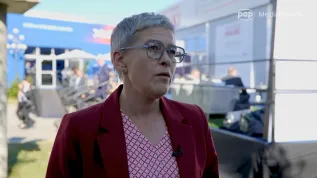Expert: In the age of AI, the scientific article will remain the leading means of scientific communication

12/09/2025 update: 12/09/2025
2 minutes of reading
Renowned scientific journals in the AI era will continue to be important in the context of trust in scientific information, believes Prof. Marzena Świgoń from the University of Warmia and Mazury (UMW) in Olsztyn.
Świgoń is examining the impact of artificial intelligence on the work of early-career researchers as part of the "Harbingers of Change" initiative. For the past ten years, scientists from the United Kingdom, the United States, France, Spain, Portugal, Russia, China, Malaysia, and Poland have been interviewing young scientists to detect signs of change in science communication: attitudes and behaviors related to searching for, selecting, developing, evaluating, and disseminating scientific information.
- Looking back at a decade of research on changes in scientific communication, we are struck by the slow pace of systemic change in various countries - said Prof. Świgoń, director of the Institute of Journalism and Social Communication at the University of Warmia and Mazury and chairwoman of the Scientific Council of the Discipline of Social Communication and Media Science, in an interview with Nauka w Polsce.
She noted that technologies are changing rapidly and this is reflected in the world of science, but this has not brought about any significant change in the system of scientific communication or the careers of young researchers.
"The scientific communication system is currently quite rigid," admitted Professor Świgoń. It still relies on scientific articles and scientific journals. "Only the form is changing, i.e., digital is replacing paper," the researcher added. Young scientists are still required to publish in reputable journals, and publications count towards scientific achievements and academic advancement.
"AI may force a change in the system," said Prof. Świgoń. However, in her opinion, the structure of the scientific article will likely change, and it will remain the leading method of scientific communication. "Reputable scientific journals in the AI era will continue to be important in the context of trust in scientific information, and therefore in building a young researcher's reputation," she concluded.
Science in Poland
wl/ agt/
The PAP Foundation permits free reprinting of articles from the Nauka w Polsce website, provided that you notify us by email once a month of your use of the website and cite the source of the article. On portals and websites, please include the linked address: Source: naukawpolsce.pl, and in journals, please include the annotation: Source: Nauka w Polsce website - naukawpolsce.pl. This permission does not apply to information in the "World" category or any photographs or video materials.
Before adding a comment, please read the Forum Rules of the Nauka w Polsce website.
Dear Reader, In accordance with the Regulation (EU) of the European Parliament and of the Council of 27 April 2016 on the protection of natural persons with regard to the processing of personal data and on the free movement of such data, and repealing Directive 95/46/EC (General Data Protection Regulation), we hereby inform you about the processing of your data. The data controller is the PAP Foundation, with its registered office in Warsaw at ul. Bracka 6/8, 00-502 Warsaw. This data is collected as part of your use of our services, including websites, services, and other functionalities provided by the PAP Foundation, primarily stored in cookies and other online identifiers installed on our websites by us and our trusted partners of the PAP Foundation. The collected data is used solely for the following purposes: • providing services electronically • detecting abuse of services
• statistical measurements and service improvement
The legal basis for data processing is the provision and improvement of services, as well as ensuring security, which constitutes the legitimate interest of the controller. Data may be shared, at the request of the controller, with entities authorized to obtain data under applicable law. Data subjects have the right to access, rectify, and erase data, and to restrict their processing. They may also withdraw consent to the processing of their personal data.
Please send all notifications regarding personal data protection to [email protected] or in writing to the PAP Foundation, ul. Bracka 6/8, 00-502 Warsaw, with the note "personal data protection"
More information about the processing of personal data and your rights can be found in the Privacy Policy. Learn more. I consent
naukawpolsce.pl







